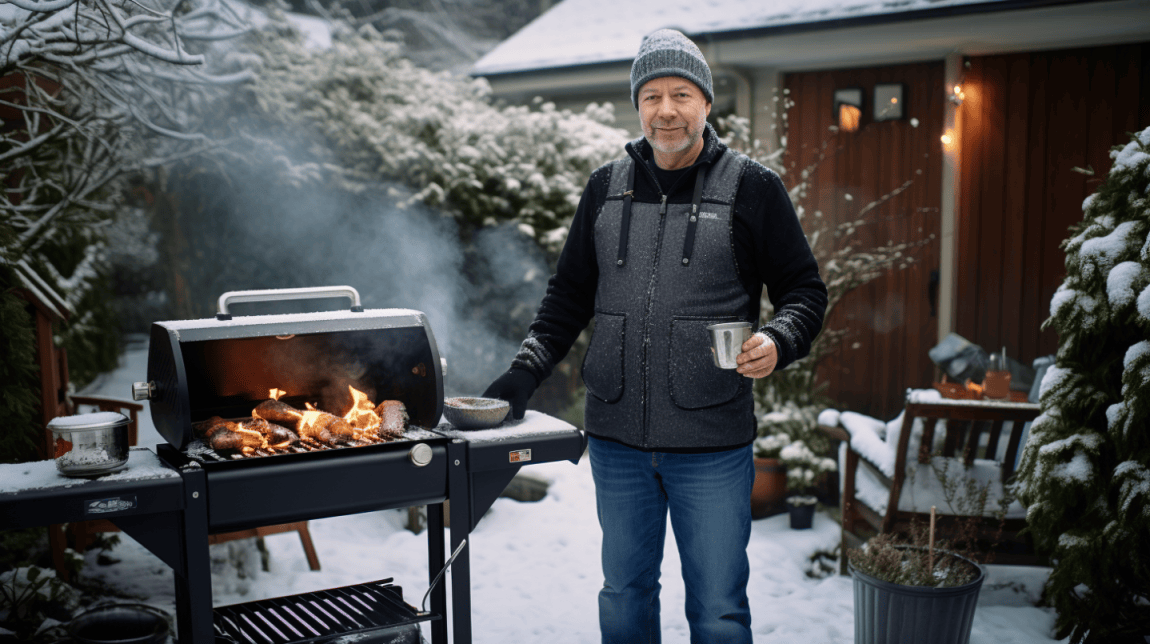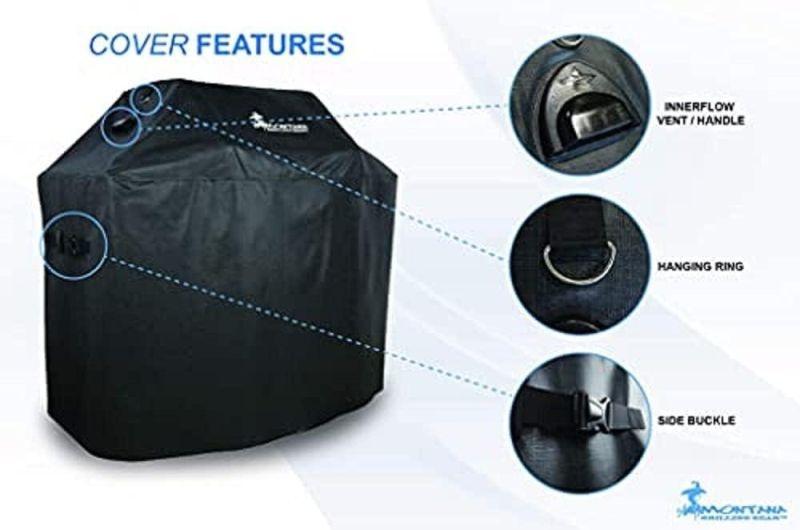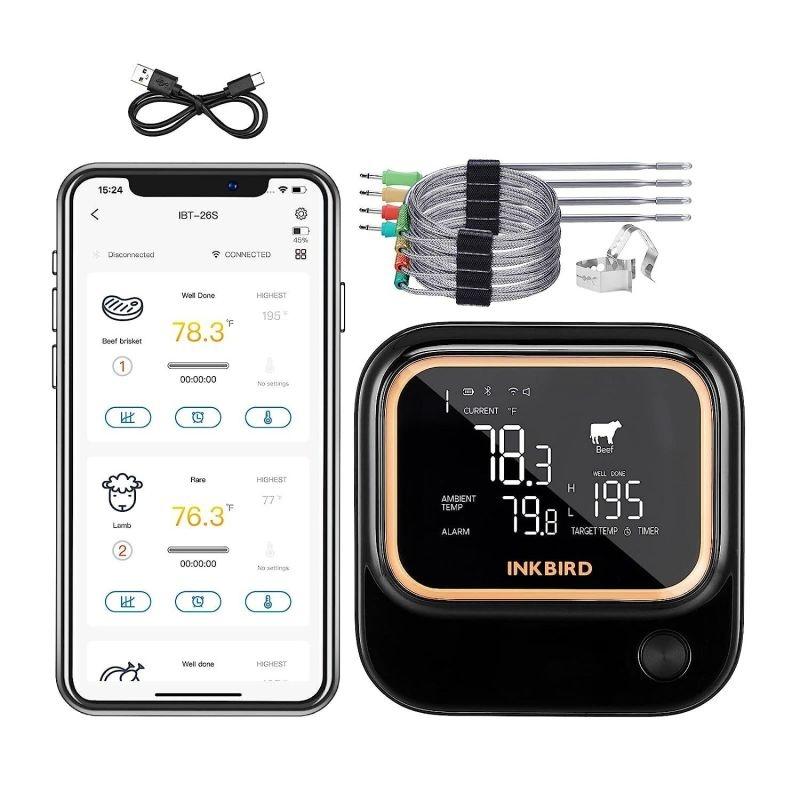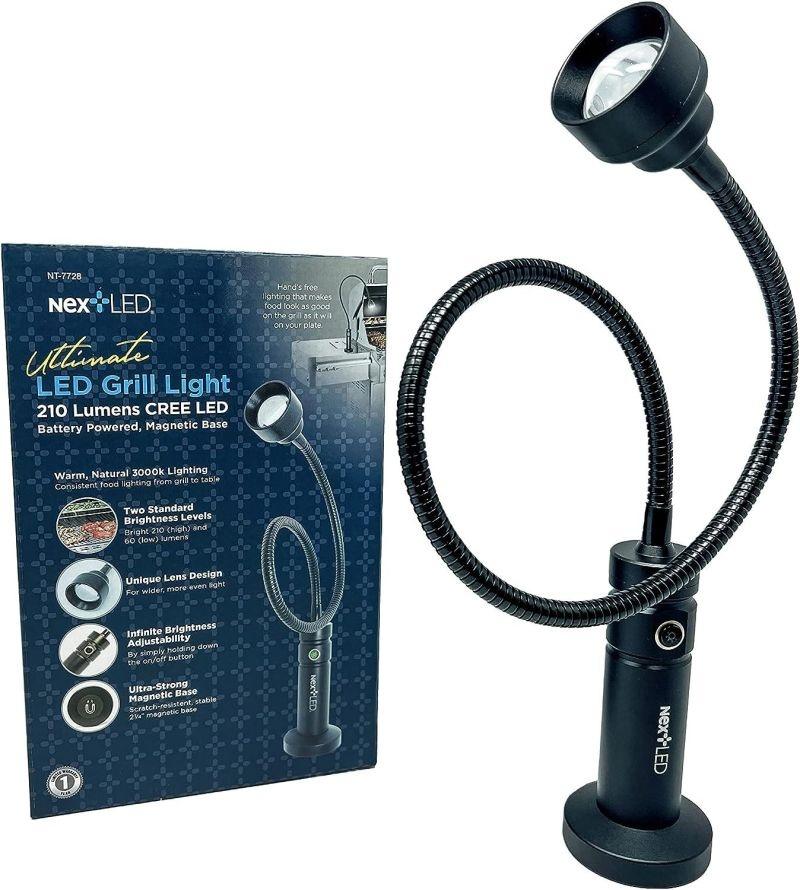Winter grilling? You bet! While we’ve been living in San Diego the past decade or so, this year I’ve been getting back in the barbecue game and that sure isn’t going to stop with the snow and cold weather coming up in just a few months. This isn’t new to me though - in Chicago I was a year-round grill master. Let’s face it, there’s something thrilling about braving the elements with tongs in hand and staying close to the fire to stay warm. So grab your winter apron and fire up that grill because any day is a good day for some sizzling goodness.
Essential Winter Grilling Equipment
We’re going to assume you already have a great charcoal grill or smoker ready to go but if not, you’ll want to pick one that is nice and sturdy and ideally resistant to rust since melted snow can wreck cast iron smokers.
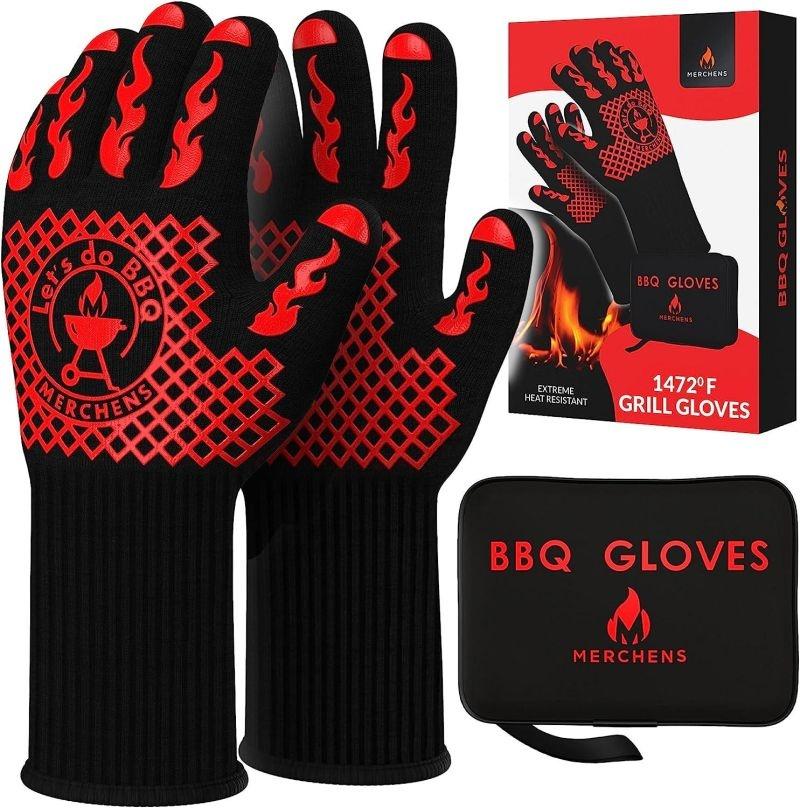
Insulated Gloves
Safety first, right? Grab a pair of insulated gloves. They're key for grilling in winter. You'll keep your hands toasty while managing the gas grill or charcoal grill. Plus, they protect you from any unexpected flare-ups.
- Example: Merchens Insulated Barbecue Gloves
All-Season Grill Cover
Next up, grill covers. These bad boys shield your grill from snow and wind. It doesn't matter if you've got a gas or charcoal set-up, there's a cover out there for you.
Meat Thermometers
Cold weather can mess with your grill's temperature. That’s where a meat thermometer comes in handy. It gives accurate readings, no matter how chilly it gets. Both of these can measure ambient grill temperature as well as internal temperature of the meat. We prefer the INKBIRD model though because having a display allows you to avoid holding your phone in the cold.
- INKBIRD 5G Wireless Meat Thermometer (see our review here)
- Meatstick 4X Wireless Grilling Thermometer (read ManTripping's review here)
Lighting Solutions
Winter means early sunsets but don’t let that stop the fun! A good lighting solution will keep you grilling into the night.
You'll also want to invest in a nice warm jacket or insulated shirt that you can wear while grilling outside so that you don't get cold tending the grill. We love brands like Carhartt since they tend to stand up to the wear and aren't going to damage easily if you rub up against the grill or spill some sauce.
Selecting Quick-Cooking and Low-Maintenance Foods
While there’s nothing wrong with the desire to enjoy a brisket that has been slow cooked in your smoker for hours during the coldest days of winter … but let’s face it … you don’t want to have to stand out there and tend to it for hours in freezing weather.
As such, bbq favorites that need less cooking time can be a great choice when grilling in winter.
Thin Cuts of Meat
Thin cuts of meat are the way to go for grilling in winter. Why? They cook quickly, saving you from spending too much time out in the cold. Think chicken breast or flank steak. With these, you'll have a delicious meal ready in minutes.
Robust Veggies
Not all foods can handle the winter elements. But robust veggies? They laugh in the face of cold temperatures! Things like carrots, potatoes, and Brussels sprouts are perfect for winter grilling.
Skewered Foods
Skewered foods aren't just about looking fancy; they're also about practicality. Stick everything on a skewer and voila! You've got easy handling and quick cooking time. Plus, there's something satisfying about eating food off a stick, right?
Pre-cooked Sides
Don't forget your sides! Pre-cooked sides are great because they complement your grilled main dish without adding extra cooking time. So while your meats and veggies are getting that lovely charred flavor, your pre-cooked sides can be warming up safely away from the grill.
So remember -It's not just about what you grill but how you grill it. Choose smartly and enjoy every bite!
Importance of Preheating and Grill Preparation
Winter grilling is a different beast. Cold weather can mess with your cook time. Here's the lowdown:
Extra Time for Preheating
Cold outdoor temps mean your grill needs more warm-up time. Don't rush it, let it heat up properly.
- Turn on your grill.
- Wait a bit longer than usual.
- Check the temperature before you start cooking.
Clean Those Grates
Dirty grates are a no-no for winter grilling. Food sticks to them like glue, messing with your cooking temperatures.
- Get a good grill brush.
- Scrub those grates until they shine.
- Repeat before each use.
Oil 'Em Up
Oil isn't just for the food, it's also great for the grates! It helps with heat transfer and keeps things sizzling even in the cold.
- Grab some oil (any type will do).
- Apply it to the grates using a brush or paper towel.
- Be careful not to overdo it!
Double-Check Internal Temperature
Before you throw that steak on, make sure your grill is hot enough! An under-heated grill means undercooked food - yuck!
- Use a thermometer to check grilling temperature.
- Aim for around 400°F (204°C) for most meats (though you may want to crank things higher to get a good sear).
- Adjust as needed based on what you're cooking.
Remember, winter grilling is all about preparation and patience! Happy Grilling!
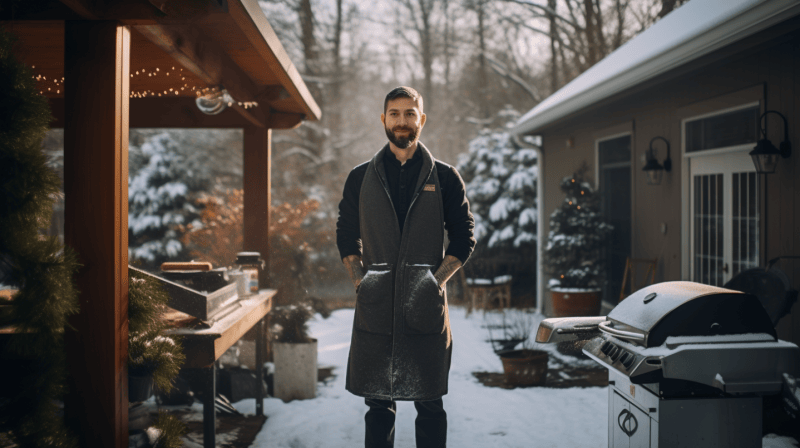
Fuel Considerations for Cold Weather Grilling
Winter grilling is a whole other ball game. It's not just about the food, it's also about fuel.
Increased Fuel Usage
Cold temperatures mean your grill works harder to keep hot. You'll burn through propane or charcoal faster than a summer barbecue. Keep an eye on your gas flow and don't be surprised if you need more.
Extra Backup Fuel
Running out of fuel mid-grill? Nightmare! Always have extra propane or charcoal ready. It's like packing an umbrella - better safe than sorry. This is good advice even during the summer and personally I always have a backup propane canister just in case.
Proper Storage Conditions
Fuel doesn't like the cold either. Store propane and charcoal in a cool, dry place to keep them at their best.
- Propane: Keep tanks upright and off the ground.
- Charcoal: Seal bags tightly, no moisture allowed!
Performance in Low Temperatures
Different fuels react differently to cold temperatures:
- Propane: Gets sluggish as temperature drops, affecting gas flow.
- Charcoal: Takes longer to heat up but maintains consistent temperature once lit.
Avoid low propane pressure problems
Propane, the gas you use for your grill, can withstand super cold temperatures. It freezes at -306.4°F, and the lowest temperature Michigan has ever seen is -50˚F. So, you don't really need to worry about your propane freezing.
But, there's more to it.
Even though propane won't freeze in winter, it does react to the cold temperatures we experience during the winter. Propane shrinks when it gets cold. If it gets super cold and your propane tank is stored outside, the volume of propane in your tank will get smaller. The issue is, if the pressure drops too much, the propane won't be able to get to your grill's burner. This means you might not be able to use your propane grill to cook, which could be a big problem when it's really cold.
- Keep your propane tank at least 30% full because the more propane in your tank, the more positive pressure there is. If very cold weather is in the forecast, check your propane tank gauge and call Depew Energy to schedule a propane delivery.
- Don’t let snow build up on your propane tank. Clear it so sunlight can reach your tank and keep it warmer.
- Turn down your thermostat. Your furnace or boiler won’t run as often, giving the pressure inside your propane tank a chance to rebuild.
Grilling in winter isn’t just battling snowflakes and icy winds, it’s also making sure your fuel is up for the fight. So next time you're craving grilled burgers in December, remember these tips!
Positioning Your Grill: Winter Edition
Most of us have a space to grill outside during the summer - whether it is your driveway or backyard patio, outdoor grilling is easy in warmer months. In winter though, there are some other considerations when grilling in winter since as much as you might like to grill in your garage and just keep the door open … that really isn’t a good idea for a variety of obvious reasons!
Find a Wind-Free Zone
Got a patio? Perfect, use it for grilling in winter. You need to find a place shielded from wind but with enough space for smoke to escape. Don't forget about ventilation! It's crucial, especially if temperatures are low.
Fire Risk Alert!
Avoid those overhanging branches or structures. They're a fire risk waiting to happen. An ideal area is somewhere open yet protected from the elements.
Accessibility Matters
You don't want your grill located at the other end of your house, do you? But also, not too close! Keep it within 10 feet away. That way, you can dash in and out without freezing your toes off.
Snow Clearing Comes First
Before you even think about setting up your grill outside, make sure to clear away any snow in the area. A dry place is essential for safe grilling. Not only will this make it safer in terms of walking around and reducing the likelihood that you might slip and fall - but for cast iron smokers and bbq grills, you will want to avoid them coming in contact with water since that can lead to rust.
Expert Tips for Successful Winter Barbecues
- Invest in a Quality Grill Cover: A good grill cover will protect your grill from harsh winter elements and help maintain the temperature inside the grill.
- Preheat the Grill: It's crucial to preheat your grill longer than you would in warmer months. This helps to reach the desired temperature despite the cold weather.
- Keep the Lid Closed: Try to minimize opening the grill lid. Each time you open it, you let out heat and increase the cooking time.
- Dress Appropriately: Dress in layers to stay warm, but avoid loose clothing that could catch fire. Don't forget to wear heat-resistant gloves.
- Plan for Longer Cooking Times: Cold weather can significantly increase cooking times. Be patient and allow extra time to ensure your food is cooked thoroughly.
- Choose the Right Foods: Opt for foods that cook quickly or can be prepared indoors and finished on the grill. This can save time and minimize exposure to the cold.
- Position the Grill Wisely: Position your grill in a place that's sheltered from the wind but still in a well-ventilated area to ensure safety.
- Keep a Thermometer Handy: A reliable meat thermometer will ensure your food is cooked to the right temperature, regardless of the weather outside.
- Have Extra Fuel: Cold weather can cause your grill to burn fuel more quickly. Always have extra propane or charcoal on hand.
- Practice Safety: Just as in summer, never leave your grill unattended, and have a fire extinguisher nearby. Snow can be used to extinguish small flare-ups.
So there you have it, folks! A few simple guidelines and you'll be a pro at winter barbecuing in no time at all!
Wrap Up Your Grill Game
So, you've got the lowdown on how to grill like a pro even when Jack Frost is nipping at your nose. Now it's time to bundle up, fire up that grill and show winter who's boss! Remember, the right gear can make all the difference between a winter grilling win or a frosty fail. And don't forget - keep things simple with quick-cooking foods and always preheat that grill.
And hey, if you're still feeling a bit chilly about the idea of grilling in the great white outdoors, no sweat! We're here to help. Drop us a line anytime or check out our other grilling guides for more tips and tricks. Now go get 'em tiger!
FAQs
What kind of fuel is best for winter grilling?
Propane gas tends to be more reliable in colder temperatures than charcoal as it doesn't require as much oxygen to burn efficiently.
Is there any special equipment I need for grilling in winter?
A good quality grill cover can protect your grill from snow and ice buildup. Insulated gloves are also handy for handling hot utensils.
How do I position my grill during winter?
Keep your grill at least 10 feet away from any flammable materials and avoid placing it directly under overhanging branches or roofs due to risk of fire.
Can I cook all types of food on the grill in winter?
Quick-cooking foods like steaks, burgers, fish fillets and vegetables are ideal for cold weather grilling as they require less time exposed to the elements.
Do I need to preheat my grill longer in cold weather?
Yes! Preheating your grill is crucial during winter months as it takes longer for it heat up due to lower ambient temperatures.
